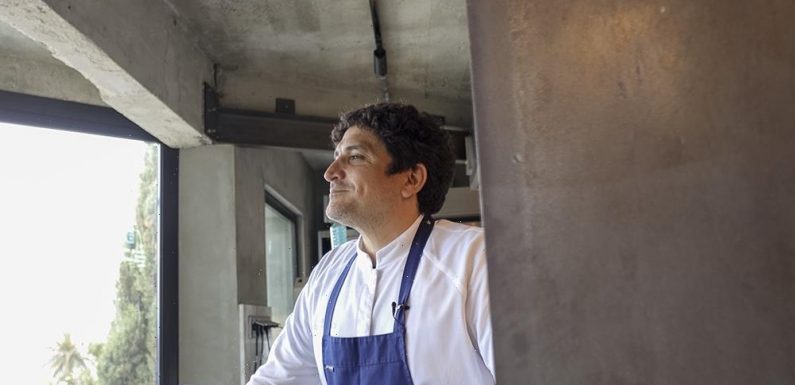
The idea for the documentary “Reinventing Mirazur,” which follows Argentine Chef Mauro Colagreco and the profound transformation he and his three-Michelin star restaurant Mirazur undergo, began in faraway Japan where French filmmakers Franck Ribière and Vérane Frediani met him while he participated in the Cook Japan event organized by restaurateur Yuji Shimoyama.
Colagreco was among the 32 chefs invited from all over the world by Shimoyama to display their cooking expertise to Japan, under one condition, to use only Japanese produce. The idea was to make a short film but it expanded to a feature-length format when Colagreco invited them to his restaurant in France to continue shooting him. Shimoyama, who appears in the documentary, is also one of the producers. “This was a one-time event, it was very difficult to organize,” he asserts.
Ribière and Frediani began filming Colagreco at Mirazur then the pandemic hit and as in life, the documentary twisted in a new, unexpected and, in many ways, fortuitous direction as the filmmakers witnessed Colagreco’s existential crisis and his decision to completely reinvent his restaurant.
“At one point, I thought he was going to call it completely quits,” says Ribière, who said they shot for about a year and amassed about 160 hours of dailies.
Like the rest of many establishments in France, Mirazur was forced to close down for months but like a butterfly from a cocoon, emerged more beautiful despite the myriad challenges it had faced.
Spending nearly all his days in his vast vegetable and flower garden during the forced break, Colagreco decided on something revolutionary, to introduce menus pegged to the cycles of the moon. Since he sourced all the restaurant’s fresh produce from his garden, where planting and harvesting were timed according to the moon’s cycles, the menus would undergo a radical change. Colagreco and his team wrote about 32 new dishes in three weeks before the reopening. He discarded all the signature dishes that brought Mirazur world fame and selected as number one in Reed Media’s World’s 50 Best Restaurants list in 2019. Following the lunar calendar meant changing the menu four times a week.
Speaking to Variety at a Basque Culinary Center dinner held in his honor after the docu’s world premiere in San Sebastian, Colagreco laughed when asked if he liked complicating his life. “Yes, in effect, we are now four different restaurants in one,” he said, adding: “But in terms of experience and innovation, there’s nothing better; it’s more poetic, it’s a return to nature.”
Spending hours in his garden during the lockdown made him reassess his priorities and devote more time to his family, to nature, Colagreco said during the 1:00 am press conference held after the multi-course dinner. “We are unbalanced as a society and as individuals, the challenge is to find that balance,” he declared.
Speaking about the filming experience, Ribière said: “You witness all this chaos in the kitchen and out of all that, there’s a moment of clarity and then this beautiful dish emerges.” “They work from 6 am to 2 am every day, and at the end of each day, the kitchen is spotless,” he exclaimed.
“We feared that the COVID-19 angle would dominate the documentary but it’s more about Colagreco’s life, his journey as a human being,” said Los Angeles-based producer Thomas Augsberger, who recently launched ERM Docs, a new documentary division at his Eden Rock Media label whose first title is “Reinventing Mirazur.”
Augsberger approached two sources willing to finance a film production at the start of a global pandemic: Swiss investor Santis Media Distribution and U.S..-based Front Berner, owned and operated by producing partners Schuyler Ransohoff and Wes Fleuchaus. “We came on board thinking it was going to be a short, so it was a happy turn of events when it grew into a feature-length documentary,” said Fleuchaus.
Despite the travel demands that stem from now owning many restaurants around the world. Colagreco is sure about one thing. “I refuse to be just a manager, I don’t want to ever stop cooking,” he said.
Source: Read Full Article